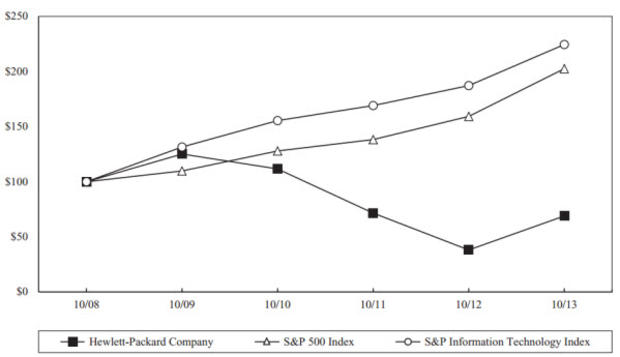Despite split, HP still faces major challenges
Hewlett-Packard (HPQ) shares are rising in pre-market trading after the technology giant said Monday it would cleave itself in two.
HP is splitting into two publicly traded companies. One, to be called HP, will focus on selling consumer PCs and printers; the other, Hewlett-Packard Enterprise, will offer corporate hardware, software and services. Reports of an expected split in the company's stock drove shares up much as 8 percent, to $35.20.
"The decision to separate into two market-leading companies underscores our commitment to the turnaround plan," said HP CEO Meg Whitman in a statement. "It will provide each new company with the independence, focus, financial resources, and flexibility they need to adapt quickly to market and customer dynamics, while generating long-term value for shareholders."
Management of the two companies will be interlocked. Whitman will become chief of Hewlett-Packard Enterprise, with Pat Russo, the retired CEO of Alcatel-Lucent and currently a HP board member, becoming chairman of the board. The CEO of HP will be Dion Weisler, who has been the executive vice president of printing and personal systems. Whitman will become chairman of the consumer company.
The split, long discussed among investors, analysts, and management, is an attempt to help the company refocus all its lines of business. In 2011, then HP CEO Léo Apotheker had proposed selling or spinning off the company's PC division, a move that the board approved, only to turn around and change its mind because of investor unhappiness with the plan.
But the company's weak performance since then seems to have convinced investors that a split is the best option. What remains unclear is whether HP's reorganization will be sufficient to boost results. For years, the company's stock has underperformed the broader market.
In 2013, HP's consumer PC sales were down by 10.2 percent from the previous year. Printing unit sales, which combined with PCs as a major profit driver, were down by 2.6 percent. Several of the company's other key business lines have seen a similar decline, including enterprise hardware sales and services, and software.
If anything, the combination of PCs and corporate systems had some benefits for sales to large businesses. HP could offer companies better pricing on PCs to help sweeten deals for large system sales. But HP has fared worse than than other large competitors, with the company last year falling fell behind China's Lenovo in PCs sold.
HP's performance this year hasn't been much better In the first nine months of the year, PC and printer sales were up 2.8 percent over 2013. But as people continue to move toward mobile computing, pressure on PC sales in general will continue to mount. HP's corporate hardware, software and services revenue is down 3.1 percent in 2014.
IBM (IBM) sold its PC division to Lenovo in 2004, before the market began to crumble. Earlier this year, IBM also sold its lower-end server business to Lenovo.
Another challenge for HP is that cloud computing and other information technology advances is continuing to increase the efficiency of servers and software. That reduces the need of big corporations to buy and maintain as many systems as in the past.
HP said it will lay off 5,000 workers as part of the restructuring, adding to the more than 36,000 people it has already cut. Still, the could struggle to get much leaner. With two publicly traded companies rather than one, there will be increased overhead and infrastructure spending, as many areas of operations will now have to be duplicated, weighing on profit margins and earnings.
